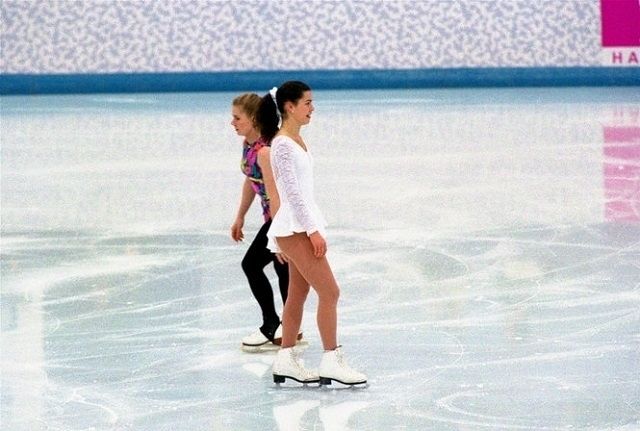5 biggest scandals in Winter Olympic history

Despite an Olympic creed that says embracing the struggle to win is more important than winning itself, scandals have been part of the Games for as long as they’ve been around. Here are five of the most infamous, and a few honorable mentions:
1. The attack on Nancy Kerrigan
The drama that had everyone’s attention at Lillehammer in 1994 was one of the most bizarre things in Olympic history.
Gold medal favorite Nancy Kerrigan was clubbed in the knee on Jan. 6, 1994, in an attack planned by the ex-husband of Tonya Harding, Kerrigan’s figure skating rival.
The hitman was supposed to break Kerrigan’s leg so she couldn’t compete in the national championships, but only bruised her, leaving her out of the championship but able to recover in time for the Olympics. Harding ended up winning the national championship.
Both Kerrigan and Harding went on to compete in the 1994 Olympics, Kerrigan just seven weeks after the attack, and their short program remains the sixth-most-watched TV show of all time. According to ESPN, 48.5 percent of American households tuned in to watch the tension-filled show.
Kerrigan went on to win silver, finishing second to Oksana Baiul. Harding finished eighth.
2. Bid bribery
Salt Lake City had attempted to get the Winter Games four times before in 1995 it was finally awarded the 2002 Games.
It wasn’t until 1998 that members of the International Olympic Committee were accused of taking bribes from Salt Lake Organizing Committee officials. Multiple members of the IOC were investigated over allegations that they took bribes in the form of direct payments, land purchase agreements, tuition assistance, political campaign donations or charitable donations.
In all, 10 members of the IOC were expelled and another 10 were sanctioned over accepting gifts from the SLOC, although nothing illegal had been done. It was the first instance of sanctions over corruption in IOC history.
Salt Lake City brought in Mitt Romney to overhaul SLOC processes and was allowed to keep the Games.
3. The French figure skating judge
Another scandal at the Salt Lake City Olympics centered around figure skating. Allegations that the pairs figure skating competition had been fixed arose after the Russians won gold despite making a technical error in their free skate while the Canadians skated perfectly.
The Canadians had tripped and fallen during the closing pose of their short program, though, leaving them in second place and needing at least five 5.9s in presentation on their free skate to win gold. Despite skating flawlessly, they received only four 5.9s, compared to the Russians’ seven.
Cheating allegations arose immediately and were aimed specifically at the French judge, Marie-Reine Le Gougne. When confronted, she reportedly said she had been pressured by the head of the French skating organization to vote for the Russians no matter what, in an apparent deal to get an advantage for France in the ice dancing competition. She later denied the allegations in a signed statement.
After an investigation, Le Gougne was suspended and the Canadians were upgraded to a gold medal. The Russians were allowed to keep their gold as there was no evidence of wrongdoing on their part.
4. The mystery man in the black suit
France’s Jean-Claude Killy won gold in downhill, slalom and giant slalom at Grenoble in 1968 following one of the biggest controversies in Olympic history.
Killy’s rival, Karl Schranz of Austria, claimed that a mysterious man in black had crossed in front of him during the slalom race, forcing him to skid to a stop. Schranz was allowed to start again and beat Killy’s time.
A Jury of Appeal later disqualified Schranz for missing a gate and gave the victory to Killy, making his alpine skiing triple crown official.
5. Salt Lake and Turin doping drama
In 2006, Italian authorities raided the Olympic Village residences of members of the Austrian biathlon and cross-country teams while investigating doping charges.
IOC officials had tipped off police and confirmed to The New York Times that at least 15 athletes had been taken in for urine and blood tests.
The tip had come after Walter Mayer, the former Nordic coach of the Austrian team, was said to be staying with Austrian athletes despite being banned from the 2006 and 2010 Games for performing blood transfusions on Olympic athletes in 2002. After blood transfusion equipment was found in the quarters of six Austrian skiers in 2002, they were banned from the Olympics for life and disqualified from the Salt Lake City Olympics.
In an unrelated 2006 doping scandal, Russian biathlete Olga Medvedtseva was stripped of her silver medal in the individual race after a positive drug test. She was also banned from competition for two years.
Honorable mentions:
- The 1986 Winter Olympics were the first in which East and West Germany competed separately. East German athletes were accused of heating the runners of their sleds before the luge and were disqualified.
- Taiwan boycotted the 1980 Winter Olympics after China was allowed to compete under the name Republic of China, which had been Taiwan’s name in previous Olympics. Taiwan skipped the games rather than compete as Chinese Taipei, which was the proposed alternative.
- Lake Placid stirred controversy at the 1980 Olympics when it planned to convert Olympic housing into a prison after the Games. It went through with the plan, and the facility has been criticized ever since for poor living conditions.
Contact Stephanie Grimes at sgrimes@reviewjournal.com. Find her on Twitter: @steph_grimes












